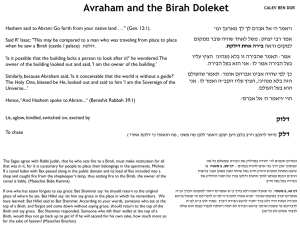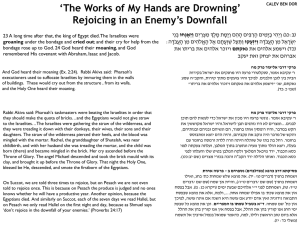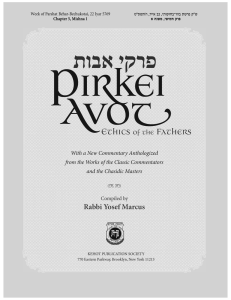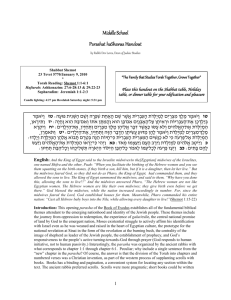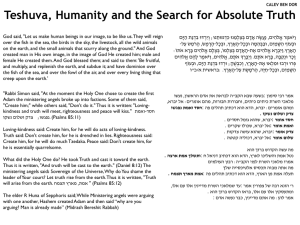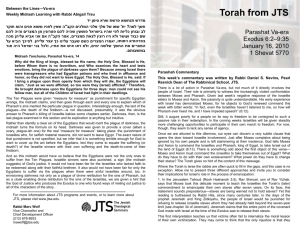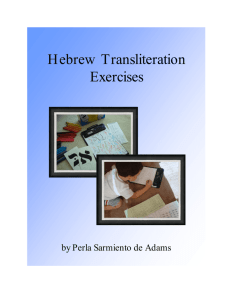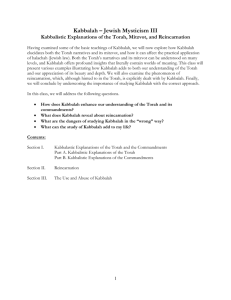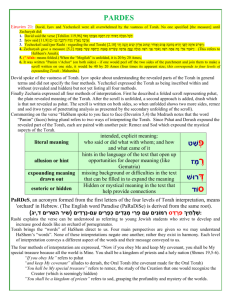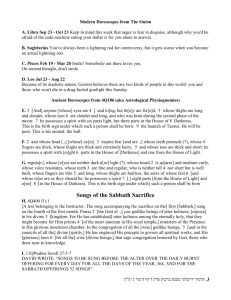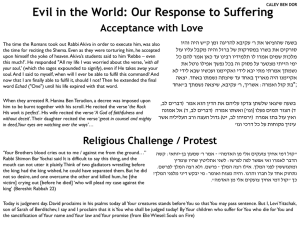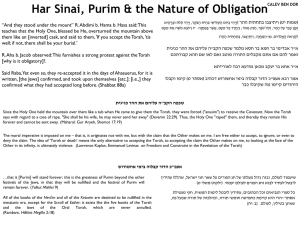Noach
advertisement
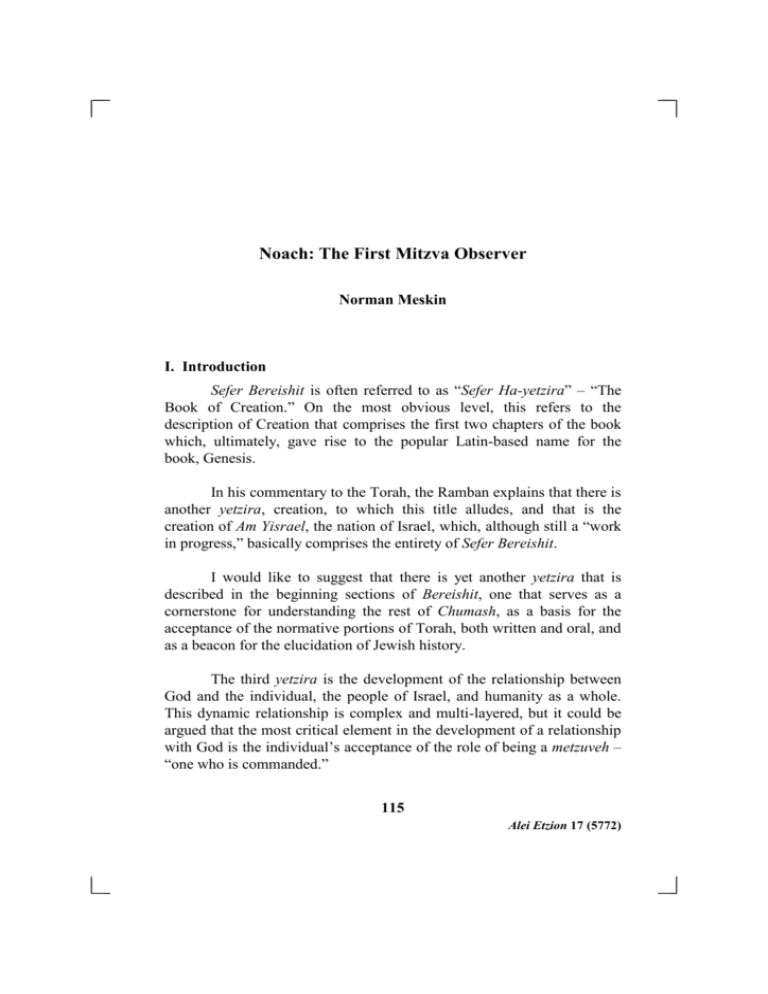
Noach: The First Mitzva Observer Norman Meskin I. Introduction Sefer Bereishit is often referred to as “Sefer Ha-yetzira” – “The Book of Creation.” On the most obvious level, this refers to the description of Creation that comprises the first two chapters of the book which, ultimately, gave rise to the popular Latin-based name for the book, Genesis. In his commentary to the Torah, the Ramban explains that there is another yetzira, creation, to which this title alludes, and that is the creation of Am Yisrael, the nation of Israel, which, although still a “work in progress,” basically comprises the entirety of Sefer Bereishit. I would like to suggest that there is yet another yetzira that is described in the beginning sections of Bereishit, one that serves as a cornerstone for understanding the rest of Chumash, as a basis for the acceptance of the normative portions of Torah, both written and oral, and as a beacon for the elucidation of Jewish history. The third yetzira is the development of the relationship between God and the individual, the people of Israel, and humanity as a whole. This dynamic relationship is complex and multi-layered, but it could be argued that the most critical element in the development of a relationship with God is the individual’s acceptance of the role of being a metzuveh – “one who is commanded.” 115 Alei Etzion 17 (5772) In explaining the Talmudic concept of Gadol ha-metzuveh veoseh mi-mi she-eino metzuveh ve-oseh, doing a good deed which you are commanded to do is greater than doing it voluntarily (Kiddushin 31a; Bava Kama 38a, 87a; Avoda Zara 3a), Tosafot provide two separate and distinct rationales. In Kiddushin (31a, s.v. gadol), Tosafot explain the priority of the metzuveh ve-oseh (one who is commanded and performs) based on the fact that only someone who is commanded has something to lose if he does not perform as commanded. This fear of not living up to Divine expectations causes a higher level of anxiety, and, consequently, warrants a greater reward. The eino metzuveh (uncommanded person) has no such fear and, therefore, there is no “downside” if the action is not up to par. On the other hand, Tosafot in Avoda Zara (3a, s.v. gadol) point out that the priority of the metzuveh ve-oseh stems from the fact that when a typical human being is “commanded” to do something, there is that little voice inside that person’s head that says: “Don’t do it. Nobody can tell you what to do!” In other words, one needs to overcome this built-in resistance in order to do as one is commanded, and that is why the reward is greater than if one does the same act voluntarily. My focus here will not be on this dichotomy of metzuveh ve-oseh and eino metzuveh ve-oseh, but rather upon the basic concept of metzuveh ve-oseh itself. I will try to demonstrate how the Torah’s narrative regarding the construction of the ark, the flood and its immediate aftermath, when viewed through the perspective of this notion of the metzuveh ve-oseh, plays a significant role in helping to develop our understanding of one of the main aspects of the relationship between human beings and their Creator. This analysis should lead to a clarification of the concept of mitzva. It should be clear that, in a very real sense, Noach was the first individual upon whom the Torah conferred the title of metzuveh ve-oseh. True, Adam and Chava were commanded in the Garden of Eden, but, 116 much to our chagrin, their actions were could hardly be characterized as metzuveh ve-oseh. Kayin was also ostensibly a metzuveh, for although the command against murder is not yet explicitly stated in the Torah, without assuming prior command his punishment is incomprehensible. But he was also not a metzuveh ve-oseh. II. Analysis of the Text The first step in the development of this thesis is a careful reading and analysis of the appropriate Torah portion, which consists of Bereishit 6:9 through 9:7. For this purpose, I have conceptualized the story of the Flood and the Ark as a one-act play with five scenes (the sixth scene is the coda) and presented an abbreviated version thereof below. Most scenes in this narrative contain the following two-part structural element: (1) God commands Noach to do something; (2) the Torah confirms that Noach did as he was commanded. The reader is encouraged to take note of the presence of this element in the various scenes as it will play an important role in the development of the theme of this article. Scene 1: Noach Is Instructed to Build the Ark (6:13-22) בָּ ָּשר- ֵקץ כָּל,ֹלקים ְלנ ַֹּח ִ -ֹּאמר א ֶ יג וַי13 And God said to Noach: ‘The end , ָּמל ְָּאה ָּה ָּא ֶרץ ָּח ָּמס- בָּ א ְל ָּפנַי–כִ יof all flesh has come before Me; for . ָּה ָּא ֶרץ- ֶאת,יתם ָּ ִמפְ נֵיהֶ ם; וְ ִה ְננִי ַמ ְש ִחthe earth is filled with violence through them; and, behold, I will destroy them with the earth. ִקנִים, ֹּגפֶר-ֲשה לְָך ֵתבַ ת עֲצֵ י ֵׂ יד ע14 Make thee an ark of gopher wood; ַה ֵתבָּ ה; וְ ָּכפ ְַר ָּת א ָֹּּתּה- ַּתעֲשֶׂ ה ֶאתwith rooms shall you make the ark, . בַ ֹּכפֶר,ּומחּוץ ִ ִמבַ יִתand shall pitch it within and without with pitch. 117 ְשֹלש:ֲשה א ָֹּּתּה ֶׂ אֲ ֶשר ַּתע, טו וְ זֶה15 And this is how you shall make it: חֲ ִמ ִשים, א ֶֹּרְך ַה ֵתבָּ ה, מֵ אֹות ַא ָּמהthe length of the ark three hundred .קֹומ ָּתּה ָּ ֹלשים ַא ָּמה ִ ּוש ְ , ַאמָּ ה ָּר ְחבָּ ּהcubits, the breadth of it fifty cubits, and the height of it thirty cubits. ַא ָּמה- וְ ֶאל,ֲשה ל ֵַתבָּ ה ֶׂ טז צ ַֹּהר ַתע ְב ִצ ָּדּה, ּופ ֶַתח ַה ֵתבָּ ה,ְת ַכ ֶלנָּה ִמל ְַמעְ לָּה ,ּושלִ ִשים ְ ָּת ִשים; ַת ְח ִתיִ ם ְשנִ ִים .ה ָ ֲש ֶׂ ַּתע 16 A light shall you make to the ark, and to a cubit shall you finish it upward; and the door of the ark shall you set in the side thereof; with lower, second, and third stories shall you make it. ,ָ ָכְ כֹל ָאֲ ֶׂשר ִָצוה ָאֹתֹו: ָנ ַֹּח, כב ַּויַּעַּ ש22 Thus did Noach; according to all .ֹלקים– ֵׂכןָעשה ִ -ָ אthat God commanded him, so did he. Scene 2: Noach and Entourage Enter the Ark (7:1-5) יתָך ְ ֵב- ַא ָּתה וְ כָּל- ב ֹא,ֹּאמר ה' ְלנ ַֹּח ֶ א וַי1 And the Lord said to Noach: ‘Come יתי צַ ִדיק ִ א ְֹּתָך ָּר ִא- כִ י: ַה ֵתבָּ ה- ֶאלyou and all your house into the ark; for . בַ דֹור ַהזֶה, ְל ָּפנַיyou have I seen righteous before Me in this generation. לְָך- ָ ִת ַּקח,הֹורה ָּ ב ִמכֹּל ַה ְב ֵה ָּמה ַה ְט -ּומן ִ ;ִשבְ עָּ ה ִש ְבעָּ ה– ִאיש וְ ִא ְשתֹו – ְשנַיִם,הַ בְ ֵה ָּמה אֲ ֶשר ל ֹּא ְטה ָֹּּרה ִהוא .ִאיש וְ ִא ְשתֹו 2 Of every clean beast you shall take for you seven and seven, each with his mate; and of the beasts that are not clean two [and two], each with his mate; זָּכָּר, ג גַם ֵמעֹוף ַה ָּש ַמיִם ִש ְבעָּ ה ִש ְבעָּ ה3 of the fowl also of the air, seven and . ָּה ָּא ֶרץ-פְ נֵי כָּל- עַ ל, ל ְַחיֹות ז ֶַרע, ּונ ְֵקבָּ הseven, male and female; to keep seed alive upon the face of all the earth. ָּאנֹּכִ י ַמ ְמ ִטיר,ד כִ י ְלי ִָּמים עֹוד ִש ְבעָּ ה וְ ַא ְרבָּ עִ ים, ַא ְרבָּ עִ ים יֹום, ָּה ָּא ֶרץ-עַ ל ַהיְקּום אֲ ֶשר-כָּל- ֶאת,יתי ִ ּומ ִח ָּ ;ָּל ְילָּה . פְ נֵי ָּהאֲ ָּד ָּמה, ֵמעַ ל,יתי ִ עָּ ִש 4 For yet in seven days, I will cause it to rain upon the earth forty days and forty nights; and every living substance that I have made will I blot out from off the face of the earth.’ 118 .’ָה, ִצוהו-ָכְ כֹלָאֲ ֶׂשר,ָנ ַֹּח, הָָ ַּויַּעַּ ש5 And Noach did according unto all that the Lord commanded him. Scene 3: The Rains Come and Stop; The Ark Comes to Rest (7:6 – 8:5) (Noach Does Not Act!) Scene 4: Noach Opens the Window and Sends Out the Birds (8:6-14) , ִמ ֵקץ ַא ְרבָּ עִ ים יֹום; ַּו ִיפְ ַּתח נ ַֹּח, ו ַוי ְִהי6 And it came to pass at the end of .חַ לֹון ַה ֵתבָּ ה אֲ ֶשר עָּ ָּשה- ֶאתforty days, that Noach opened the window of the ark which he had made. וְ ִהנֵה, יא ו ַָּתב ֹּא ֵאלָּיו ַהיֹונָּה לְעֵ ת עֶ ֶרב11 And the dove came in to him at ַקלּו- כִ י,יה; ַּוי ֵַּׂדע נ ַֹּח ָּ ִ ַזיִת ָּט ָּרף ְבפ- ֲעלֵהeventide; and lo in her mouth an olive. הַ מַ יִם ֵמעַ ל ָּה ָּא ֶרץleaf freshly plucked; so Noach knew that the waters were abated from off the earth. , ֵמאֹות ָּשנָּה-יג ַוי ְִהי ְב ַא ַחת וְ ֵשש , ָּח ְרבּו ַה ַמיִם,בָּ ִראשֹון ְב ֶא ָּחד ַלח ֶֹּדש ִמכְ ֵסה- ֶאת,מֵ עַ ל ָּה ָּא ֶרץ; ָוַּי ַּסר ָנ ַֹּח . וְ ִהנֵה ָּח ְרבּו פְ נֵי ָּהאֲ ָּד ָּמה,ָ ַּוי ְַּרא,הַ ֵתבָּ ה 13 And it came to pass in the six hundred and first year, in the first month, the first day of the month, the waters were dried up from off the earth; and Noach removed the covering of the ark, and looked, and behold, the face of the ground was dried. Scene 5: Noach and Entourage Leave the Ark (8:15-19) .נ ַֹּח לֵאמֹּר- ֶאל,ֹלקים ִ -א ָ טו ָ ַּוי ְַּדבֵׂ ר15 And God spoke to Noach, saying: 119 וְ ִא ְש ְתָך , ַה ֵתבָּ ה– ַא ָּתה- ִמן, טז צֵׂ א16 “Go forth from the ark, you, and .בָּ נֶיָך ִא ָּתְך-ְשי ֵ ּובָּ נֶיָך ּונyour wife, and your sons, and your sons’ wives with you. ,בָּ ָּשר- ִא ְתָך ִמכָּל- ַה ַחיָּה אֲ ֶשר-יז כָּל ָּה ֶר ֶמש ָּהר ֵֹּמש-ּובכָּל ְ בָּ עֹוף ּובַ ְב ֵה ָּמה ָּה ָּא ֶרץ–הוצא ( ַּהיְצֵׂ א) ִא ָּתְך; וְ ָּש ְרצּו-עַ ל . ָּה ָּא ֶרץ- ּופָּרּו וְ ָּרבּו עַ ל,בָּ ָּא ֶרץ 17 Bring forth with you every living thing that is with you of all flesh, both fowl, and cattle, and every creeping thing that creeps upon the earth; that they may swarm in the earth, and be fruitful, and multiply upon the earth.” ,בָּ נָּיו-ְשי ֵ נ ַֹּח; ּובָּ נָּיו וְ ִא ְשתֹו ּונ- יח ָ ַּויֵׂצֵׂ א18 And Noach went forth, and his . ִאתֹוsons, and his wife, and his sons’ wives with him; , ָּהעֹוף- ָּה ֶר ֶמש וְ כָּל- כָּל, ַה ַחיָּה- יט כָּל19 every beast, every creeping thing, ָ,יהם ֶ ָּה ָּא ֶרץ–ל ְִמ ְשפְ ח ֵֹּת-רֹומש עַ ל ֵ , כֹּלand every fowl, whatsoever moveth . ַה ֵתבָּ ה- יצְ או ִמןupon the earth, after their families; went forth out of the ark. Scene 6: God Blesses and Makes a Covenant with Noach and the Rest of Humanity and the Animal Kingdom (9:1-17) ;בָּ נָּיו-נ ַֹּח וְ ֶאת- ֶאת,ֹלקים ִ -ָא ָ א ַּויְב ֶׂרְך1 And God blessed Noach and his -ומלְאו ָ ֶׂאת ִ ,ָורבו ְ ֹאמר ָל ֶׂהם ָפְ רו ֶׂ וַּיsons, and said to them: “Be fruitful . הא ֶׂרץand multiply, and replenish the earth. - עַ ל כָּל, י ְִהיֶה,ּומֹוראֲ כֶם וְ ִח ְת ֶכם ַ ב עֹוף ַה ָּש ָּמ ִים; ְבכֹּל- וְ עַ ל כָּל,חַ יַת ָּה ָּא ֶרץ , ְדגֵי ַהיָּם-ּובכָּל ְ אֲ שֶ ר ִת ְרמֹּש ָּהאֲ ָּד ָּמה .בְ י ְֶדכֶם נ ִָּתנּו 2 And the fear of you and the dread of you shall be upon every beast of the earth, and upon every fowl of the air, and upon all wherewith the ground teems, and upon all the fishes of the sea: into your hand are they delivered. 120 ָּלכֶם י ְִהיֶה, ַחי- ֶר ֶמש אֲ ֶשר הּוא- ג כָּל3 Every moving thing that lives shall -ֶׂםָאת ֶׂ ָנ ַּת ִתיָלכ, כְ י ֶֶׂׂרקָעֵׂ ֶׂשב: ל ְָּאכְ לָּהbe for food for you; as the green herb ָ... כֹלhave I given you all… ,ָורבו; ִש ְרצּו בָּ ָּא ֶרץ ְ ָפְ רו, ז וְ ַּא ֶׂתם7 And you, be you fruitful, and בָּ ּה- ְּורבּוmultiply; swarm in the earth, and multiply therein.” בָּ נָּיו- וְ ֶאל,נ ַֹּח-ֹלקים ֶאל ִ -ֹּאמר א ֶ ח וַי8 And God spoke to Noah, and to his . ִאתֹו לֵאמֹּרsons with him, saying: יתי ִ ְב ִר-ָאת ֶׂ ָמ ִקים ֵׂ ָה ְננִי ִ , ט וַּאֲ נִי9 “As for Me, behold, I establish My . ַאחֲ ֵריכֶם,ז ְַר ֲעכֶם- וְ ֶאת, ִא ְתכֶםcovenant with you, and with your seed after you; ,ָה ַּחיה אֲ ֶשר ָ ִא ְתכֶם ַּ ֶׂנפֶׂש-י ָוְ ֵׂאת ָכל ַחיַת ָּה ָּא ֶרץ-ּובכָּל ְ בָּ עֹוף בַ ְב ֵה ָּמה ְלכֹּל ַחיַת,ִא ְת ֶכם; ִמכֹּל י ְֹּצ ֵאי ַה ֵתבָּ ה ...הָּ ָּא ֶרץ 10 and with every living creature that is with you, the fowl, the cattle, and every beast of the earth with you; of all that go out of the ark, even every beast of the earth… ,יה ָּ ית ִ בֶ עָּ נָּן; ְּור ִא,טז וְ הָּ י ְָּתה ַה ֶק ֶשת ּובֵ ין,ֹלקים ִ - בֵ ין א,לִזְ כֹּר ְב ִרית עֹו ָּלם -בָּ ָּשר אֲ ֶשר עַ ל- ֶנפֶש ַחיָּה ְבכָּל-כָּל .הָּ ָּא ֶרץ 16 And the bow shall be in the cloud; and I will look upon it, that I may remember the everlasting covenant between God and every living creature of all flesh that is upon the earth.” ז ֹּאת:נ ַֹּח- ֶאל,ֹלקים ִ -ֹּאמר א ֶ יז וַי17 And God said to Noach: “This is ּובֵ ין, בֵ ינִי, אֲ ֶשר הֲ ִקמ ִֹּתי,הַ ְב ִרית- אֹותthe token of the covenant which I have . ָּה ָּא ֶרץ-בָּ שָּ ר אֲ ֶשר עַ ל- כָּלestablished between Me and all flesh that is upon the earth.” In his commentary on the phrase, “a light [source] shall you make for ark” (6:16), Rabbi Samson Raphael Hirsch offers an insight which frames the entire narrative cited above: …Surely it is not without reason that the arrangements for the ark are so specially told us, and later on again stressed that Noah did everything “ken,” exactly as prescribed. God 121 could have saved Noah in a thousand different ways. Whether the size of the ark was sufficient normally to hold its contents,1 etc., are considerations which we really can leave aside. God chose one man, he is to save himself, his family, and the animal world for the future, he can save them and himself if, and only if, he does everything as, and only as, he is commanded. גדול המצווה ועושה ממי שאין מצווה ועושה, doing a good deed which you are commanded to do being greater than doing it spontaneously, is one of the first Jewish principles. Contrary to the opinion usually held, only that has true value which is done in fulfillment of the Will of God. What one does according to one’s own prompting etc. has only doubtful, secondary importance. What a lot more could Noah have done in the 120 years; built a hundred arks, etc. So that what it may want to tell us here is that Noah restricted himself to do, but to do exactly and completely, that which God had ordered, and left the rest to God. (Emphases in original translation) Rabbi Hirsch asserts that this biblical narrative teaches us the importance of being a metzuveh ve-oseh – one commanded by God who acts accordingly. In essence, Noach and his family, along with the animal kingdom, can be saved if, and only if, he does exactly as God instructs him. Noach satisfies this condition and God, consequently, fulfills His promise. Rabbi Hirsch was clearly led to this conclusion by the repetition of the following sequence in the narrative: instructions from God to Noach to act in a certain way and confirmation that Noach proceeded to do precisely as he was told. III. The Problem However, close inspection reveals that this same text contains an anomaly that threatens Rabbi Hirsch’s thesis and undermines our understanding of the relationship between God and Noach, in particular, 1 This issue is addressed by the Ramban (6:19) – ed. 122 and God and humanity, in general. The problem is that the pattern of “command from God and then confirmation that Noach satisfied the demand,” that develops quite clearly in Scenes 1 and 2, is glaringly absent from Scene 4 (opening the window and sending out the birds) before recurring in Scene 5. Scene 4, therefore, is the only instance in this entire narrative where Noach is not a metzuveh and acts on his own! This enigmatic finding gives rise to two complementary questions: 1. Why did Noach act without first getting instructions from God? 2. Why didn’t God command Noach regarding these particular actions? IV. The Solution I would like to suggest that Noach’s perception of the scope of being commanded by God (being a metzuveh) was that God only commanded humans regarding “extraordinary,” “unnatural” or “irrational” events or behaviors. Building an ark for 120 years in one’s backyard and then bringing your family and a whole animal menagerie into the ark at high noon, with the sun still shining, certainly constitute unnatural acts! Noach understood that when God commands about such things – about ritual matters or bein adam la-Makom issues (matters exclusively between man and God) – one must listen and accept. He could take no initiative regarding these matters because he would not know where to begin! However, there is nothing unnatural or extraordinary about opening the window to see what the weather is like outside. There is nothing ritualistic or irrational about finding out if the water has receded after a flood. So the first question above is answered: Noach didn’t think he needed to wait for a command from God for something so logical and so pedestrian – something that made so much sense! 123 God, for His part, did not command Noach about these particular actions precisely because He wanted Noach to learn the full scope of being “commanded.” He wanted him to appreciate the true essence of Torah and of mitzva performance and of one’s relationship with God. But how was this lesson taught? After Noach acted independently and was (probably) ready to disembark, God addressed him, as follows: “Go forth from the ark…” (8:16). With these words God taught Noach that He does not only command man regarding unnatural or irrational matters, matters that man would never realize on his own. That would be an incorrect and incomplete understanding of the mitzvot of God. “Mitzvot” cover the whole range of human behaviors – even those for which one thinks there is no need for a Divine directive because they are so obvious (e.g., the prohibitions against stealing, killing, raping, etc.) The Torah then tells us that “Noach went forth” (8:18) – a simple, logical, straightforward action – but one he could not perform until so instructed by God. So, now, the second question above is also answered: God did not command Noach about certain actions in order to teach him the vital lesson that all mitzvot are gezeirot ha-Melekh, decrees of the King, and their performance is not dependent on our understanding the rationale behind any or all of them. It might be suggested that the seemingly excessive reward that Noach received was, in part, due to his successfully internalizing this fundamental theological message. After all, given the circumstances, survival itself could readily be perceived as a more than adequate reward. Clearly, God deemed that more was necessary. Perhaps the covenant of continuity and the permission to become meat-eaters were meant to suggest that now that Noach had learned this fundamental lesson, humanity was ready to move forward with its new mission. Now people could slaughter animals to satisfy their basic needs, simultaneously maintaining the Torah standards of kashrut, purity, ritual sacrifice, empathy for all creatures, and the like. 124 V. Other Support for this Concept: A Sampling Textual support for this fundamental understanding of the concepts of mitzva and metzuveh can be found in numerous places in the Torah, in the Talmud, and the Midrash. One example from each of these three sources follows below. First, let us examine the wording of the mitzva to honor one’s father and mother as recorded in the second set of the Ten Commandments, which appears in Parshat Va’etchanan (Devarim 5). ָ כַּאֲ ֶׂשר, ִא ֶמָך- ָּא ִביָך וְ ֶאת-טו כַבֵ ד ֶאת ,ֹלקיָך–ל ְַמעַ ן יַאֲ ִריכֻן י ֶָּמיָך ֶׂ -א ָ ָ 'צִ וְ ָך ָה 'ה- אֲ ֶשר, עַ ל ָּהאֲ ָּד ָּמה,ִיטב לְָּך ַ ּולְמַ עַ ן י .ֹלקיָך נ ֵֹּתן ָּלְך ֶ -א 15 Honor your father and your mother, as the Lord your God commanded you; that your days may be long, and that it may go well with you upon the land which the Lord your God gives to you. Commenting on the phrase, “as the Lord your God commanded you,” which does not appear in the first set of the Ten Commandments, Rashi notes (ibid., s.v. Ka’asher): Also regarding the honor of father and mother were they commanded at Mara, as it says (Shemot 15:25): “There He set before them statutes and ordinances.” (Based on Sanhedrin 56b) Rabbi Naftali Tzvi Yehuda Berlin (the Netziv) understood the extra phrase not as an historical reference as Rashi did, but rather as defining a key aspect of the concept of mitzva. These are his words in his commentary Ha’amek Davar (ibid., s.v. Ka’asher): Since the mitzva of honoring one’s father and mother is a logical mitzva with which all man’s faculties agree, the Torah, here, warned that one should perform the mitzva because it is a command by God like all other chukkim of 125 the Torah. The celebrated commentary Me’am Lo’ez explains this phrase in a very similar fashion: Here the Torah says, “Honor your father and mother as God your Lord commanded you.” This is somewhat difficult to understand, since God gave all the commandments. However, this teaches that a person should not honor his parents merely because it is morally and ethically right. It is true that a person’s parents raise him from the time he is an infant, but if one honors one’s parents because of the moral imperative and not because it is God’s commandment, then he is not considered doing God’s will and is not rewarded… (The Torah Anthology, Volume XVI, p. 240) The approaches of both the Ha’amek Davar and the Me’am Lo’ez serve to concretize the notion that being a metzuveh implies that God is the absolute authority; conformity to God’s will is not dependent upon rationalization, accommodation, or conceptualization. Our second example comes from the Talmud (Berakhot 33b): Mishna: If one [in praying] says “Thy mercies extend to a bird’s nest,” or “Be Thy name mentioned for well-doing,” or “We give thanks, we give thanks” – he is silenced. Gemara: We understand why he is silenced if he says “We give thanks, we give thanks,” because he seems to be acknowledging two powers [in Heaven]; also if he says, “Be Thy name mentioned for well-doing,” because this implies, for the good only and not for the bad, and we have learned, “A man must bless God for the evil as he blesses Him for the good.” But what is the reason for silencing him if he says “Thy mercies extend to the bird’s nest”? Two Amoraim in the West (Israel), Rabbi Yose ben 126 Avin and Rabbi Yose ben Zevida, give different answers. One says it is because he creates jealousy among God’s creatures, and the other because he presents the measures taken by the Holy One, blessed be He, as springing from compassion, whereas they are but decrees. This passage from the Talmud seems to expand the definition of metzuveh beyond the scope provided by the commentaries on the Chumash that were cited above. The aforementioned sources taught that we are obliged to perform mitzvot because they are manifestations of God’s will, with no concern for their inherent morality or ethicality. The Talmud, on the other hand, teaches that even if we think we understand the rationale behind a mitzva, we dare not permit that thought to motivate our behavior. Doing so undermines God’s authority and, as a consequence, our subservience. The final example comes from the halakhic midrash on Sefer Vayikra, the Sifra (Torat Kohanim). Toward the end of Parashat Kedoshim, we find the following verse (Vayikra 20:26): “And you shall be holy unto Me; for I the Lord am holy, and I have set you apart from the nations, that you should be Mine.” Rashi’s commentary to the phrase “And I have set you apart from the nations, that you should be Mine,” based on the Midrash, seems to establish yet another level to the concept of metzuveh (s.v. Va-avdil): If you are separated from them [by not performing forbidden acts], behold, you are Mine, but if not, behold, you are [akin to] Nebuchadnezzar, the King of Babylonia, and his cohorts. Rabbi Elazar ben Azarya says: From where do we know that a person should not say: “I am disgusted with pig meat,” or “It is impossible for me to wear sha’atnez,” but rather he should say: “I desire these, but what can I do, now that my Father in Heaven has decreed upon me that I may not”? The verse says: “And I have set you apart from 127 the nations that you should be Mine,” that your separation from them should be for My Name’s sake – he separates himself from sin and [thus] accepts on himself the yoke of the Kingdom of Heaven. (Based on Sifra Kedoshim, 11:22) This midrash, cited by Rashi, tightens the screws even further, for now we are exhorted to deny our true feelings about a particular mitzva and, even if we hate what is prohibited, we may not allow our personal proclivities to, in any way, guide or motivate our behavior. Our sole concern in performing the mitzva is to fulfill our obligation as a metzuveh. VI. The Importance of the Concept “Na’aseh ve’nishma” (“We will do and we will listen”) – the exclamation of Benei Yisrael at Har Sinai – is generally cited as the ultimate expression of acceptance of the will of God. The Talmud (Shabbat 88a) lists several rabbinic teachings that glorify Benei Yisrael for this act. On the same page, however, there appears a well-known statement by Rav Avdimi that appears antithetical to the approach mentioned above. Basing his view on a verse in the Torah, Rav Avdimi indicates that had God not “raised up the mountain over their heads” (and threatened them), they would have not accepted the Torah. Almost all the classical commentators are troubled by this seeming contradiction and they attempt to explain it away. The Maharal, on the other hand, takes the position that coercion was necessary and requires no apologetics. For the Maharal, the “contract” between God and Benei Yisrael could never be a matter of volition alone; for a contract that is merely a voluntary agreement has no standing as it can be jettisoned at any time. According to the Maharal, coercion was necessary because in its absence, there can be no such concepts as reward and punishment, or 128 doing God’s will, or the like. Put another way, without coercion we would never be metzuveh – invited maybe, but certainly not “commanded.” The declaration “Na’aseh ve’nishma” was important but it wasn’t sufficient. Our relationship with God must be predicated on more than a whim. It must be based on our total acceptance of His will, even when our human faculties dictate otherwise. VII. Conclusion It has been demonstrated that a seemingly enigmatic stylistic or literary inconsistency in the account of the Flood contains a profound lesson regarding the substance of the relationship that a human being can forge with God. The concept of metzuveh lies as the cornerstone of our performance of mitzvot, and thus it can be said that Parashat Noach begins the Torah’s exploration of that Divine requirement. Sefer Bereishit can now be seen as the Book of Many Creations: the creation of the world, the creation of the Jewish Nation, and the creation of the relationship between God and the human race. 129 130
